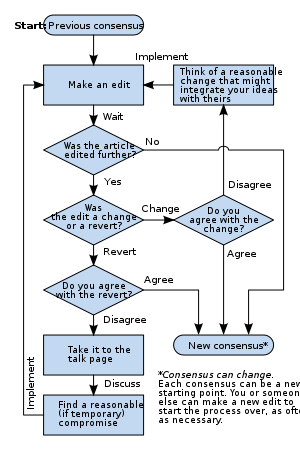Wikipedia:Lectures/4/Summary

On the right we have a recap from our last lecture. Today, we will be concentrating on this cycle, which is probably the second most misunderstood page on Wikipedia (shortly after this).
Let's take the example that you're going to do something that could potentially be controversial and you don't know who you need to talk to to get it to work. However, if you go onto the talkpage and asked, you would find a few owners, and would probably keep you all week. Instead, just make the edit you had in mind, even though you know it might sooner or later ruffle someone's feathers. Wait to see what happens and if nothing does, you just got yourself consensus.
However, someone might come and revert you. rules dictate that they have to come and talk to you, so they do so. Now you have some ranting old editor on the talkpage demanding to know what you are doing. But if they're not, just go to their talkpage and ask them why they reverted. Bound by the rules of wikiquette, they are compelled to talk to you - but you first, which can only be a good thing. However, you now have an angry person, and may need to seek mediation, which will be dealt with next week. This all is really having consensus as a side effect, as supposed to the main object. Of course, this means not to do it too often - but remember to be bold.
However, on the other side of the coin, the opposite to BRD is simply silence. No-one says anything about the edit, for maybe a day, or the day after... until eventually your edit has consensus. This is your simple relationship between silence and consensus. Next topic: Stonewalling - Join us now!
